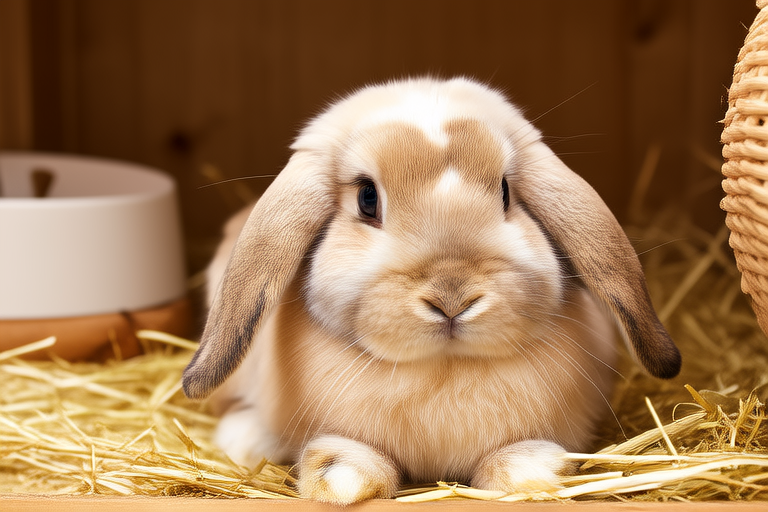The Cozy Life of a Lop Rabbit: Your Ultimate Guide to Fluffiness
Imagine a world where softness and companionship reign supreme. Enter the realm of lop rabbits, the epitome of fluffiness with their drooping ears and gentle demeanor. These charming creatures have captured the hearts of many, offering a unique blend of affection and low-maintenance care. In this comprehensive guide, we delve into the world of lop rabbits, exploring their breeds, dietary needs, grooming routines, and much more.
Lop Rabbit Breeds: A World of Fluffy Ears
Lop rabbits come in various breeds, each with its own distinct appearance and personality. The most popular include the English Lop, French Lop, Holland Lop, and Mini Lop. The English Lop, known for its exceptionally long ears that can reach up to 20 inches, is a sight to behold. Their large size and gentle nature make them perfect for those looking for a calm and serene pet. On the other hand, the French Lop is a robust breed with shorter ears, making it a sturdy companion. The Holland Lop, the smallest of the lop breeds, is a favorite among apartment dwellers due to its compact size and playful disposition. Lastly, the Mini Lop, slightly larger than the Holland Lop, offers an ideal balance between size and energy.
The Allure of Fluffiness
One cannot help but marvel at the sheer volume of fur that adorns these lovable creatures. Their plush coats range from silky smooth to slightly coarse, depending on the breed. Each lop rabbit’s coat is not just a matter of aesthetics; it also serves as insulation, protecting them from the elements. Their drooping ears add to their endearing appearance, giving them a perpetually curious and attentive look. The combination of their floppy ears and dense fur makes them irresistible to pet lovers everywhere.
Ideal Living Environments
Creating a comfortable home for your lop rabbit is crucial to their well-being. A spacious indoor hutch or a dedicated room equipped with a litter box, food and water dishes, and plenty of toys is ideal. Ensure that the area is warm and draft-free, as lop rabbits are sensitive to temperature changes. Adding soft bedding like hay or fleece provides a cozy resting spot and helps maintain hygiene. Regular cleaning of their living space is essential to prevent odors and potential health issues.
Dietary Needs: Nourishing the Fluff
A balanced diet is key to maintaining the health and happiness of your lop rabbit. Fresh hay should be the cornerstone of their diet, providing essential fiber for digestive health. Pellets formulated for rabbits should be offered in moderation, as overfeeding can lead to obesity. Fresh vegetables and fruits, such as carrots, spinach, and apples, can be given as treats but should not exceed 10% of their daily intake. Always introduce new foods gradually to avoid digestive upset.
Grooming Tips: Keeping the Fluff in Check
Grooming your lop rabbit regularly ensures their coat remains clean and free from mats. Brushing their fur at least twice a week with a slicker brush helps remove loose hair and prevents shedding. During molting seasons, more frequent brushing may be necessary. Bathing is generally not recommended unless absolutely necessary, as it can strip natural oils from their skin. Instead, spot clean any soiled areas with a damp cloth. Trimming their nails every few weeks will also prevent overgrowth and discomfort.
Common Health Issues and Expert Advice
Like all pets, lop rabbits are susceptible to certain health issues. Dental problems, often caused by improper diet or genetics, can lead to pain and difficulty eating. Regular dental check-ups and a diet rich in hay can help prevent these issues. Ear infections, though rare, can occur if the ears are not kept clean and dry. Monitoring your rabbit’s ears for signs of redness, discharge, or odor is important. Additionally, obesity is a concern for lop rabbits, especially those with limited exercise. Ensuring they have ample space to move around and engaging them in interactive activities can help maintain a healthy weight.
Expert advice from veterinarians and experienced rabbit owners is invaluable. Dr. Sarah Thompson, a small animal veterinarian, recommends regular veterinary check-ups and vaccinations to safeguard your rabbit’s health. She emphasizes the importance of early intervention when noticing any unusual behavior or physical symptoms.
Interactive Activities to Keep Them Happy and Healthy
Engaging your lop rabbit in fun and stimulating activities is vital for their mental and physical well-being. Providing tunnels, cardboard boxes, and chew toys encourages exploration and play. Introducing them to safe outdoor areas under supervision allows them to enjoy fresh air and sunshine. Training your rabbit to respond to simple commands, such as coming when called or sitting on command, can strengthen your bond and provide mental stimulation. Interactive feeding puzzles, where treats are hidden within, challenge their problem-solving skills and keep them entertained.
Personal anecdote: I once had a Holland Lop named Whiskers who loved nothing more than chasing after a feather toy. Watching him dart across the room with such enthusiasm brought joy to my days. His playful antics reminded me of the importance of keeping our furry friends active and engaged.
The Unique Charm and Care Requirements of Lop Rabbits
Adopting a lop rabbit means welcoming a bundle of fluff into your life. Their gentle nature and affectionate demeanor make them wonderful companions. However, it is important to recognize the unique care requirements of these rabbits. Their longer ears require extra attention to cleanliness and health. Ensuring they have a suitable environment, a nutritious diet, and plenty of love and attention will reward you with a loyal and loving pet.
In conclusion, lop rabbits offer a delightful addition to any household. With their fluffy coats, drooping ears, and charming personalities, they bring warmth and companionship. By understanding their specific needs and dedicating time to their care, you can ensure a lifetime of happiness and health for both you and your lop rabbit.
